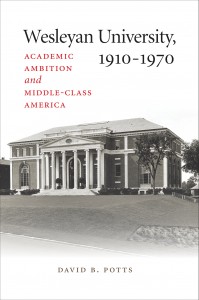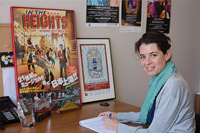EDITOR’S NOTE: FORMATIVE YEARS
My 40th Wes reunion is fast approaching as of this writing. Perhaps because I work in South College, Wesleyan exists more in the present for me, though I certainly have fond memories of my undergraduate years. But lately I’ve been reminded of that formative time in my own life, which had been preceded by a formative decade for Wesleyan.
 That would be the ’60s, when Wesleyan reshaped itself as a university with graduate programs, launched a vigorous effort to recruit students of color, and committed itself to coeducation. David Potts ’60 tells this story (and many others) in vivid detail in his second volume of Wesleyan history, Wesleyan University, 1910–1970: Academic Ambition and Middle-Class America (Wesleyan University Press), covering the period 1910 to 1970 (see page 40).
That would be the ’60s, when Wesleyan reshaped itself as a university with graduate programs, launched a vigorous effort to recruit students of color, and committed itself to coeducation. David Potts ’60 tells this story (and many others) in vivid detail in his second volume of Wesleyan history, Wesleyan University, 1910–1970: Academic Ambition and Middle-Class America (Wesleyan University Press), covering the period 1910 to 1970 (see page 40).
Wesleyan is fortunate that Dave is so skilled at buttressing a good tale with meticulous research carried out over decades. Some readers from more seasoned classes will remember the Butterfield years (1943–1967) as a time of great intellectual ferment and significant change at Wesleyan. For those who want to understand Wesleyan in the latter half of the 20th century, it’s an essential and marvelously told story.
I mention the ’60s because much of the Wesleyan that took shape then has endured, particularly the spirit of educational experimentation in a small university setting and the notion that students should create their own curricular experience, with faculty guidance. Wesleyan offers an education that is much in demand by students throughout the world, but that doesn’t mean the institution should be content to rest on its merits—and it isn’t.
As President Roth says in his column (see also, story on page 6), Wesleyan is working with consultants to imagine how spaces will relate to learning in the future. Although the traditional lecture style remains in use, many faculty members are experimenting with new ways of interacting with students that require spaces different from classrooms with rows of seats.
That brings me back to my formative years at Wesleyan. When I hear about the variety of pedagogical innovation occurring at Wesleyan—the subject of a future article in this magazine—I don’t feel nostalgic, but I’d love to be back in class (without final exams!). Perhaps I’ll get a chance, but regardless, I’m grateful that Wesleyan helped me become an enthusiastic lifelong learner.
William Holder ’75, editor
wholder@wesleyan.edu

